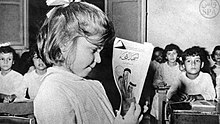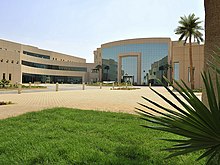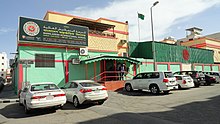Education in Saudi Arabia
As of 2016, religious studies average a total of nine periods a week at the primary school level, compared to an average about 23 periods a week total for mathematics, science (physics, chemistry, biology and geology), social studies, Arabic language, English language and physical education.
The universities consists of colleges and departments that offer diplomas, and bachelor's, master's and PhD degrees in various scientific and humanities specializations.
[40] In 2005, King Abdullah implemented a government scholarship program to send young Saudi nationals to Western universities for undergraduate and postgraduate studies.
[44] In the late 1970s the Saudi government greatly increased university spots for women as a way of slowly progressing and not to clash with traditional culture at the time.
Nora bint Abdullah al-Fayez, a US-educated former teacher, was made deputy education minister in charge of a new department for female students.
More recent developments include the adoption of academic acceleration methods and the establishment of gifted education classes in public schools.
[citation needed] Despite early policies and regulations, formal gifted education programs in public schools were established only in 2002.
[65] Further policies were enacted from the Companions Foundations for Giftedness and Creativity in 2002 also commonly known as Mawhiba, to establishment of special education classes in schools by 2018.
[citation needed] In a study consisting of 1,100 special education major students at a university in Saudi Arabia, researchers found that 34% of participants did not want to teach for the rest of their careers.
[71] Students with disabilities in Saudi Arabia may use assistive technology (AT) such as smartboards, tablets, software, and computers to help them meet educational goals.
Part of these transition services require schools to partner with local businesses, which help students’ career development.
Most teachers surveyed believe that school-business partnerships help students improve social, communication, personal, and work skills.
[74] Another 2021 survey of special education teachers in Riyadh found that parents are not as involved in transition plans as they ought to be because schools do not provide them with enough guidance.
Special education teachers additionally do not see principals and administrators as being knowledgeable and skillful in developing a positive school culture and climate.
[40] Before 2018, a large number of private schools (including international and foreign ones) were run in rented villas or buildings in several cities of the country.
In April 2004, Asharq Al-Awsat reported that the education ministry crafted a plan to get rid of schools functioning in rented buildings by 2011.
[76] Several columnists and parents frequently expressed their displeasure and grievances regarding schools being run in villas and often asked the Saudi education authorities implement stringent rules for the same.
[77][78][79][80] In May 2013, the education ministry updated rules and regulations for schools operating in leased villas, instructing institution's authorities to ensure the premises strictly adhere to the building code and added that building owners and real estate companies were required to obtain approval prior to renting the premises to schools.
[85] In May 2018, after reaching the deadline, the Saudi authorities closed down 113 schools across the country after they failed to shift their premises to buildings designed for educational purposes.
[97] According to the results of the demographic survey conducted by the General Authority for Statistics, Ministry of Economy and Planning in 2007 the incidence of illiteracy among the Saudi population was 13.7%.
[101] One of the World Bank reports suggested the relatively high adult literacy rate of Saudi Arabia, considering the continued low level of primary enrollment, derived from the successful use of religious organizations, particularly local mosques and local religious institutions such as Koranic schools for the provision of ancillary educational services, which is a trend of particular note in the MENA region.
In particular, the memorization by rote of large parts of the Qu'ran, its interpretation and understanding (Tafsir) and the application of Islamic tradition to everyday life is at the core of the curriculum.
"[109] Indeed, such control has stifled critical thought, and as a result, the education system does not necessarily foster innovation and creativity, both of which are essential to development.
[110] The religious sector of the Saudi national curriculum was examined in a 2006 report by Freedom House which concluded that "the Saudi public school religious curriculum continues to propagate an ideology of hate toward the 'unbeliever', that is, Christians, Jews, Shiites, Sufis, Sunni Muslims who do not follow Wahhabi doctrine, Hindus, atheists and others".
[115] The Tatweer program is reported to have a budget of approximately US$2 billion and focuses on moving teaching away from the traditional Saudi methods of memorization and rote learning towards encouraging students to analyze and problem-solve as well as creating a more secular and vocationally based education system.
[105][116] A comprehensive Human Rights Watch review of the Education Ministry-produced school religion books for the 2016–17 school year found that some of the content that first provoked widespread controversy for violent and intolerant teachings in the aftermath of the September 11, 2001 attacks remains in the texts today, despite Saudi officials' promises to eliminate the intolerant language.
[117] In 2021, The Washington Post newspaper published a report on the measures taken by Saudi Arabia to clean textbooks from paragraphs considered anti-Semitic and anti-women.
David Weinberg, director of international affairs for the Anti-Defamation League in Washington, said that references to demonizing Jews, Christians and Shiites have been removed from some places or have toned down, noting the deletion of paragraphs that talk about killing gays, infidels and witches.
[120] Many of these criticism point out the fact that the current economic development in the region can not be supported by traditional Arab educational culture that emphasizes on rote learning.
[120] The wide implementation of the English language in the education system is especially seen as an important reform that must happen, as it is the lingua franca used in large multi-national oil and gas companies.














